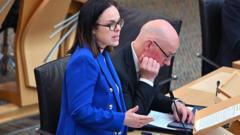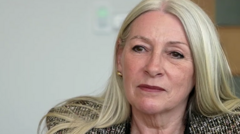Why Did the BBC Pause Its Gaza Documentary Due to Impartiality Issues?

Understanding the Controversy Behind "Gaza: Doctors Under Attack"
The decision by the BBC to shelve the documentary "Gaza: Doctors Under Attack" has sparked intense debate and criticism. Commissioned over a year ago, this film aimed to shed light on the experiences of Palestinian medics in the war-torn region of Gaza. However, the BBC has cited concerns over impartiality as the primary reason for not airing the documentary, leading to accusations of censorship and political suppression. This article will explore the details surrounding the documentary, the implications of the BBC's decision, and the broader context of media coverage in conflict zones.
The Documentary in Focus
"Gaza: Doctors Under Attack," also known as "Gaza: Medics Under Fire," was produced by Basement Films and directed by Karim Shah, Ramita Navai, and Ben de Pear. The film aims to document the harrowing experiences of healthcare professionals working amidst chaos and violence, providing a unique perspective on the humanitarian crisis in Gaza.
The documentary was initially slated for broadcast in February but has faced delays and ultimately been shelved, stirring controversy among media professionals and public figures alike. The BBC’s announcement to not broadcast the film has raised several questions about editorial independence and the responsibilities of media organizations in reporting sensitive issues.
BBC's Stance on Impartiality
In a statement, the BBC expressed its commitment to reporting on the Middle East conflict fairly and impartially. The organization's leadership emphasized that it is crucial to avoid any perception of bias in its reporting, especially on a topic as contentious as the Israeli-Palestinian conflict.
This commitment to impartiality is rooted in the BBC's charter, which mandates that the organization provides balanced coverage on controversial issues. The BBC acknowledged that discussions with Basement Films have not yielded a viable path for airing the documentary without risking an appearance of partiality. The organization admitted that the film had not passed its final pre-broadcast sign-off processes, leading to the conclusion that it could not be aired under current circumstances.
The Reactions from Production and Media Professionals
Ben de Pear, the founder of Basement Films and one of the film's directors, has voiced strong criticism of the BBC's decision. During a panel discussion at the Sheffield Documentary Festival, he accused the BBC's director general, Tim Davie, of failing to uphold journalistic standards. De Pear claimed that editorial decisions were being made from a public relations perspective rather than a journalistic one, which he argues compromises the integrity of the BBC as a news organization.
De Pear's remarks highlight the tension that often exists between news organizations and the pressures of maintaining impartiality in politically charged environments. His comments resonate with a broader concern among journalists about the challenges they face in reporting on sensitive issues without falling into the trap of perceived bias.
Public and Cultural Reactions
The shelving of "Gaza: Doctors Under Attack" has not only drawn criticism from media professionals but also from public figures. High-profile personalities, including actress Susan Sarandon and presenter Gary Lineker, have accused the BBC of censorship. An open letter signed by various cultural figures, including Dame Harriet Walter and Maxine Peake, described the BBC's decision as "political suppression." The letter argued that the public deserves to see the film and honor the bravery of its contributors.
This backlash underscores the significant role that documentaries and media narratives play in shaping public understanding of complex geopolitical issues. The voices of those directly affected by conflict, such as the Palestinian doctors featured in the documentary, are crucial in fostering empathy and informing public opinion.
The Broader Context of Media Coverage in Conflict Zones
The controversy surrounding the documentary is indicative of larger issues within media coverage of conflict zones. Journalists often grapple with the challenge of maintaining impartiality while also providing a voice to those affected by violence. In the case of Gaza, the complexities of the Israeli-Palestinian conflict make it particularly difficult for media organizations to navigate these waters without facing accusations of bias.
Moreover, the issue of censorship in media is not new. Journalists working in war zones frequently encounter obstacles that hinder their ability to report freely. The fear of repercussions from governments, militant groups, or even their own organizations can lead to self-censorship, which undermines the fundamental principles of journalism.
Implications for Future Reporting
The BBC's decision to shelve the documentary raises critical questions about the future of media reporting in conflict areas. As the organization continues to face scrutiny over its approach to impartiality, it must also consider the implications of its choices on public trust and the representation of marginalized voices.
Moving forward, media organizations must strike a balance between adhering to impartiality standards and ensuring that the stories of those impacted by conflict are told. This may involve revisiting editorial guidelines and embracing more innovative approaches to coverage that prioritize human experiences over political considerations.
Conclusion
The controversy surrounding "Gaza: Doctors Under Attack" illustrates the complex interplay between journalistic integrity, political pressures, and the representation of marginalized voices. As the BBC navigates these challenges, it is essential for media organizations to remain committed to their core mission: to inform the public about critical issues while providing a platform for underrepresented perspectives.
As audiences continue to call for transparency and accountability in media reporting, the question remains: how can news organizations ensure they fulfill their duty to report impartially while also honoring the stories that deserve to be told? This ongoing dialogue will shape the future of journalism, especially in contexts fraught with conflict.
Frequently Asked Questions
What is "Gaza: Doctors Under Attack" about?
"Gaza: Doctors Under Attack" is a documentary that aims to highlight the experiences of Palestinian medics working during the ongoing conflict in Gaza.
Why did the BBC decide not to air the documentary?
The BBC cited concerns about impartiality and the potential perception of bias as the primary reasons for shelving the documentary.
Who are the key figures involved in the documentary?
The documentary is directed by Karim Shah, Ramita Navai, and Ben de Pear, the founder of Basement Films.
What criticisms have been leveled against the BBC regarding this decision?
Critics, including journalists and public figures, have accused the BBC of censorship and political suppression, arguing that the decision undermines the integrity of journalism.
How does this controversy reflect broader issues in media coverage of conflict zones?
The situation highlights the challenges journalists face in maintaining impartiality while also representing the voices of those affected by violence, often leading to self-censorship.
As the media landscape continues to evolve, what role do you believe documentaries should play in shaping public awareness of conflict and humanitarian crises? #MediaIntegrity #Gaza #JournalismEthics
Published: 2025-06-20 13:51:06 | Category: technology



